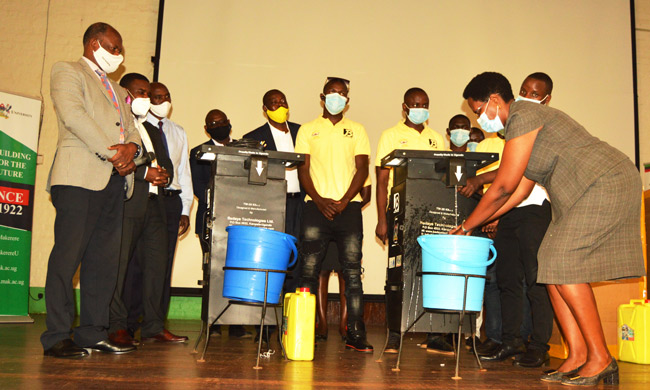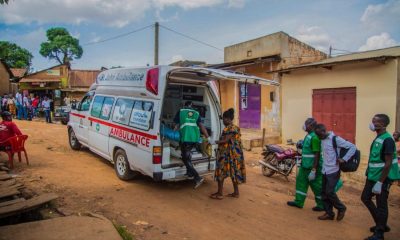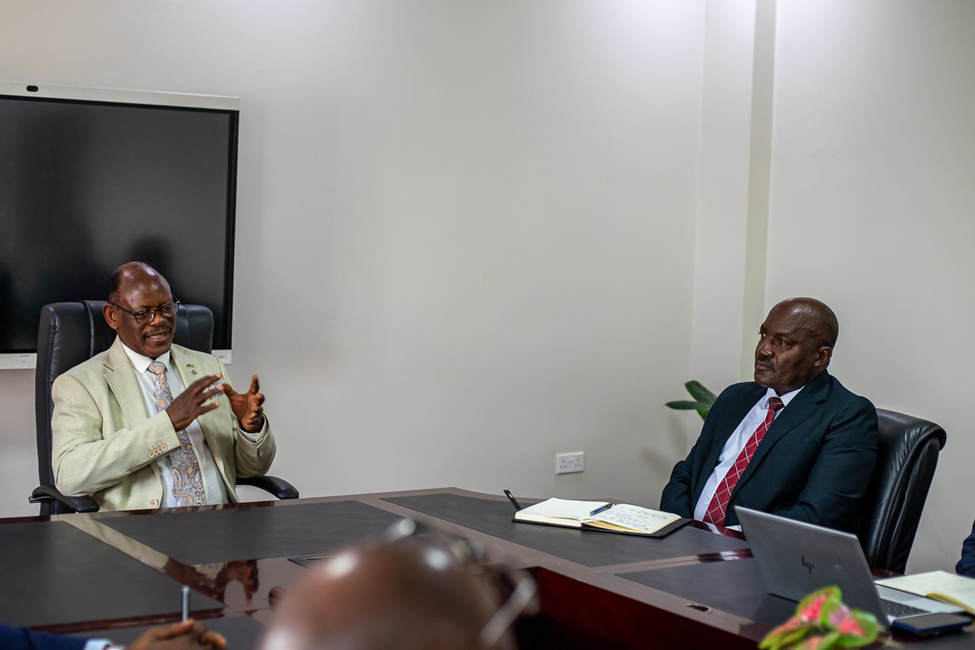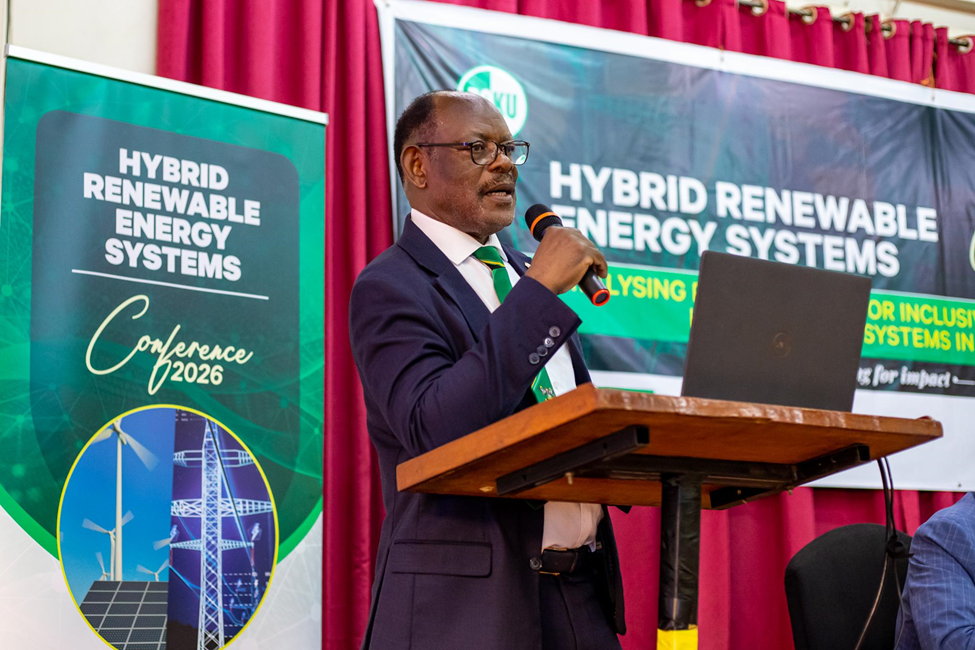Makerere University has donated three Touchless Handwashing (Tw-20) Kits to Mulago National Referral Hospital and another one to the College of Health Sciences (CHS). The donation was presided over by the university Vice-Chancellor Prof. Barnabas Nawangwe at the University Main Hall during the media engagement and handover ceremony on 24th August, 2020.
The three kits donated to Mulago hospital were handed over to Dr. Christine Byanyima who represented the Hospital Director. She expressed appreciation for the identification of Mulago Hospital as a beneficiary and a long term partner.
“Mulago is a big institution with a lot of capacities. Mulago has treated over 6,000 patients of COVID 19 and has currently over 50 patients onward. Uganda is in Phase 3 of the pandemic with community infections and it is so distressing when patients come in. This donation will go a long way in the prevention and control of infections. Mulago will deploy it in areas of more traffic”, Dr. Byanyima said.
The kit for Makerere University College of Health Sciences was handed over to Dr. Waiswa Gonzaga. Dr. Waiswa was grateful to the research team and the university for considering the college among the first recipients of the donation.
He said this donation will boost the college capacity since it did not close because the Post Graduate students have been heavily engaged with activities of COVID 19, and at the same time, conducting teaching and learning.
“ We are right now undertaking examinations and this donation is timely to be stationed in one centre during face to face clinical examinations where handwashing is one of the key requirement. In our emergency unit at Casualty, social distancing is difficult, so handwashing technology will be of great importance”, Dr. Waiswa said
Makerere University recently invented the TW-20 Kit as a responsive technology to the COVID-19 Pandemic resulting from the need to limit contact with surfaces while ensuring diligent hand hygiene.
The university is implementing a project titled,” Development of a Green Low-Cost Touchless Handwash Technology ( TW-20 Kit) for public Shared Spaces”, funded by the Government of Uganda through the Makerere University Research and Innovation Fund (Mak-RIF).
The project team is composed of Dr. Joshua Wanyama as the Principal Investigator (PI) from the Department of Agricultural and Biosystems Engineering, College of Agricultural and Environmental Sciences (CAES), Dr. Robert T Ssekitoleko (Co-PI) from the Department of Physiology, College of Health Sciences, Dr. Nakawuka Prossie (MakCAES), Mr. Oluuk Isaac from Badaye Technologies Ltd- a private firm owned by Makerere University Alumni and Mr. Julius Mugaga (MakCHS).
The media engagement and handover ceremony was witnessed by the project partners from the Department of Agricultural and Biosystems engineering, Makerere University Biomedical Engineering Unit, Makerere University Mak-RIF Secretariat, Badaye Technologies Ltd and the leadership of the two colleges-CAES and CHS.
Handing over the TW-20 kits, the Vice-Chancellor Prof. Barnabas Nawangwe expressed pride as a Vice Chancellor on grounds that he was seeing Makerere do what it is expected of it.
“I am proud because Makerere is becoming more and more relevant to Uganda’s population who are the owners of the university. I am proud because I see that finally our products -the graduates are becoming job creators and not jobseekers. I am also proud because you can finally see that there is collaboration between units within the university in research and innovation” The Vice Chancellor said.
Prof. Nawangwe noted that the science of dealing with viruses is one of the most advanced sciences because up to now none understands how they behave as they are studied and keep on changing.
The professor said COVID -19 has devastated the world more than anything else probably more that even the world wars because the whole world is affected at the same time without anybody firing any guns.
“Economies are devastated because of that tiny organism called the corona virus. So humanity must innovate in all ways if we are to survive and I am happy that Makerere University is taking the lead role in addressing the issue of COVID-19”, The VC said.
The Vice-Chancellor congratulated the research team saying they were given money slightly over a month ago and they already have the innovation.
“The other unique thing about this innovation is the level of ingenuity and home made in Uganda and at Makerere University, the beautiful black color, the IT in it, timing how long one is washing hands with a clear sound and message and data collection. If you are going to make more improvements at least for Makerere, put a camera so that I see who is washing and who is not washing”, the VC appreciated.
Prof. Nawangwe said Makerere has been at the fore front of fighting COVID-19 and has presented a number of innovations to the country to demonstrate the capacity of the university that has been there to drive Uganda’s economy to become a middle income country.
The Vice Chancellor applauded the Government Uganda, for the first time for giving Makerere University quite a big amount of money just for research and innovations saying, no university in Africa has got that kind of money just for research.
He also applauded the Government of Uganda for improving the welfare of the academic staff in all public universities noting that all these are aimed at universities giving back and improving the welfare of Ugandans.
He also expressed happiness about the alumni forming a company saying, one of the focus areas of the university strategic plan is to churn out as many companies as the university can from the research and innovations done to create jobs for the multitude of the young people roaming on streets.
Prof. Nawangwe also stressed that everything possible is being done to protect the university community from the Corona pandemic noting that almost 80% of the PhD staff stay on the hill.
The Vice Chancellor reported that one of the university staff had tweeted for having tested positive for COVID-19 and hence the university had restricted public and staff access into the university, banned face to face meeting, enforcing the Standard Operating Procedure and encouraging staff to work from home.
Prof. Nawangwe warned staff that the country may be headed for the worst.
“For three months we were seeing people dying all over the world and nobody had died in Uganda and now the number is increasing. We have closed all the gates so that all people accessing the university pass through the main gate so that they can be monitored.
We have banned all physical meetings, people must meet online. We are insisting that everybody must wear their mask properly not covering their mouth only and not wearing masks as necklaces. We are also emphasizing that people sanitize before they enter the buildings”. Nawangwe stated.
The Mak-RIF representative Dr. John Mutenyo described the recipient institutions as lucky and the innovation as timely and relevant given the current situation of COVID -19 pandemic.
“More importantly, this is a product and an innovation from Makerere University and it is made in Uganda by Ugandans”. Said Dr. Mutenyo.
Dr. Mutenyo thanked the Government of Uganda for the continued good and fruit yielding working relationship with Makerere University.
He said it is fulfilling that the government chose to support research at Makerere University and its partners- other universities, private sector and others
“In the past Financial Year 2019/2020 Makerere University received shs. 30 bn for research and innovation. In the second financial year 2020/2021, the university has so far received shs 15 bn towards the same cause and has pledged continued support to the university.
It is through such generosity and support from government that the university has come out with approaches to curb the spread of the COVID 19 pandemic. Through government support the university is able to conduct research translating into findings and approaches contributing to Uganda’s development and the subsequent high ranking in research”, Dr. Mutenyo said.
The Principal Investigator, Dr. Joshua Wanyama said when the first COVID -19 case in Uganda was announced in March 2020, Badaye (a private firm owned by Mak Alumni) embarked on developing and testing the first prototype of the TW-20 Kit to automate handwashing.
He explained that TW as an acronym signifies the,” Touchless Wash” while,”20” signifies the 20 seconds which are minimally recommended by WHO to effectively hand wash with soap.
He said that after the development of the first prototype, the Kit was trialed in the Kasubi-Kawaala suburb and Kawaala Health Centre IV for a month to obtain field based preliminary results for proof-of-concept and feedback from users.
Dr. Wanyama reported that the results were convincing and based on the results, there was need to improve the design of the Kit and thus Badaye partnered with Makerere University to move the project further.
“With support from Mak-RIF, the design has been improved and 15 Kits fabricated and installed at different publicly shared spaces in Kampala Metropolitan Area. The results are exciting; we have recorded over 65000 handwashers as of 23rd August 2020 from the Kits installed in just one week of Installation”, Dr. Wanyama stated.
The 15 beneficiaries of TW-20 Kits include:- Makerere University, Makerere University Hospital, Mulago National Referral Hospital, Kawempe National Referral Hospital, Luweero town Market and Kiruddu National Referral Hospital. Others are Kalerwe Market, Kawaala Health Centre IV, Nansana- Masitoowa market, Entebbe Grade B Hospital, Nakasero Market, Nakawa Market, Mbuya market and Mukono Health Centre IV.
“With the current progress on hand washing hygiene adherence, we have reported a need to increase the number of kits installed and also scale out to different points and this is where we need a hand from different developmental partners and Mak-RIF to expand our collective impact in the COVID 19 fight”, The PI Dr. Joshua Wanyama submitted.
Julius Mugaga working with Badaye Technologies Ltd is an Alumni of Makerere University who did his Bachelors in Bio medical engineering and currently an MSc student in Bio informatics and junior staff at Makerere University.
He said Badaye Technologies Ltd is composed of a young team of young minds motivated to address community challenges but because they are young, they thought of partnering with big institutions like Makerere University.
He was appreciative that the Makerere research team trusted and mentored them to come up with TW-20 Technology.
“The technology can be summarized in three terms- the touchless handwashing kit is “Smart, Responsive and Revolutionalised kit ”, first with the hardware bit of it which does the handwashing and then, the cloud that stores the data of the hand wash of every record of water and soap consumption and any technical troubleshooting of the device”, Mugaga stated.
Mugaga said the major component of the Kit is the spout where water and soap come from but the system is built with solar, a battery, and can also be plugged in electricity.
The kit is touchless and pedal-less with audio guided user interaction during handwashing in customized languages with English as a default language.
This system dispenses soap, gives you time of about 10 seconds to rub before it can give you rinsing water.
Other unique features of the TW-20 Kit are:
Remote monitoring, digital communication and daily use data transmission via TW-20 view, handwashing with soap as per the recommended WHO guidelines, frugal with good soap and water use metrics.
The TW-20 Kit is also a Green technology that uses solar, battery with AC –Mains as back up, it’s a low-cost technology, appropriate for pubic shared places like markets, hospitals, schools, restaurants etc and proudly made in Uganda by Ugandans.
As of now, one kit costs UG Shs.1.6million but with big orders the cost may reduce up UG Shs. eight hundred thousand.
Report Compiled by:
Jane Anyango,
Principal Communication Officer, CAES.


 General2 weeks ago
General2 weeks ago
 Health4 days ago
Health4 days ago
 General2 weeks ago
General2 weeks ago
 General5 days ago
General5 days ago
 Agriculture & Environment3 days ago
Agriculture & Environment3 days ago














